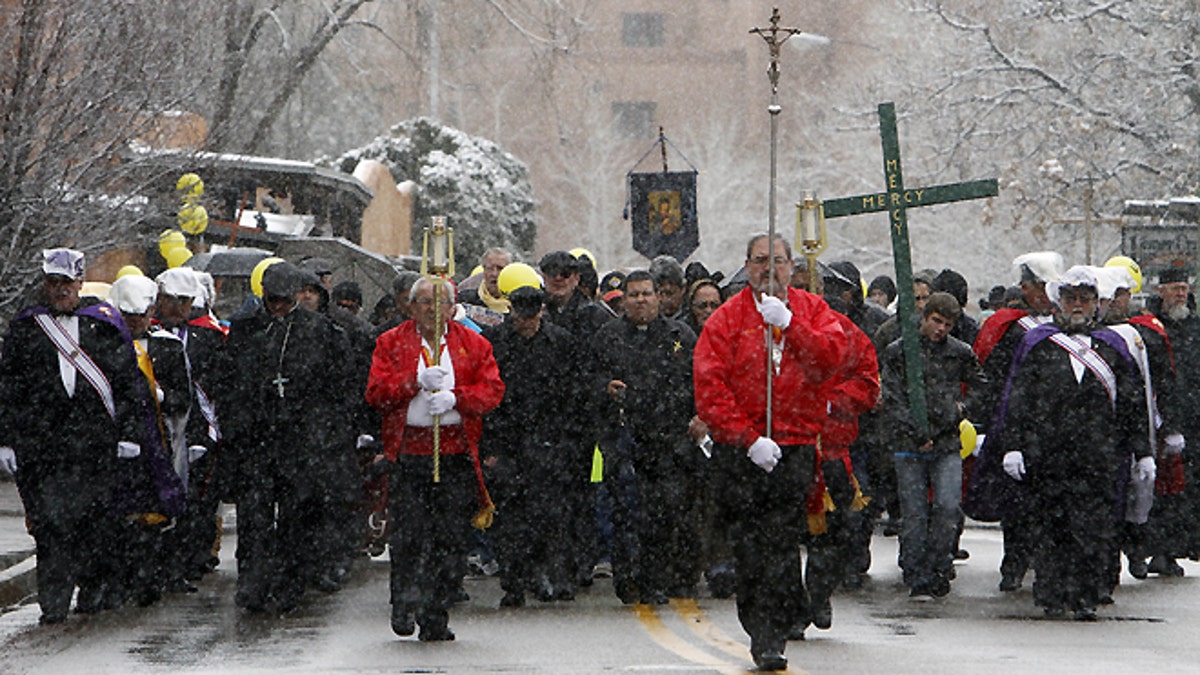
Jan. 21, 2015: A pro-life march near the State Capitol in Santa Fe, N.M. (AP Photo/Santa Fe New Mexican, Luis Sanchez Saturno)
I was a young nurse at a hospital in Maryland when the Supreme Court handed down its 1973 verdict in Roe v. Wade.
At that time, politics was the furthest thing from my mind but, even then, I could not reconcile the court’s decision with what I knew to be true. I had taken an oath to “devote myself to the welfare of those committed to my care” yet the act of abortion destroyed an innocent life.
Forty two years after Roe v. Wade, we have lost more than 56 million innocents to the horrors of abortion. There is much work to be done in order to ensure that the unborn will be able to see the light of day, but there are also signs of hope.
During my more than 40 years in the health care field, I saw the joy in young parents’ eyes when their newborn child first entered the world. I held the hands of grieving spouses and children as they said final goodbyes to their loved ones and, tragically, I witnessed a young woman lose her life due to the effects of a botched abortion. These experiences only deepened and reaffirmed my conviction that each life is precious and worth protecting.
Forty two years after Roe v. Wade, we have lost more than 56 million innocents to the horrors of abortion. There is much work to be done in order to ensure that the unborn will be able to see the light of day, but there are also signs of hope.
Forty two years after Roe v. Wade, we have lost more than 56 million innocents to the horrors of abortion. There is much work to be done in order to ensure that the unborn will be able to see the light of day, but there are also signs of hope.
For example, in my home state of Tennessee last year, we passed a landmark amendment to our state Constitution that will allow lawmakers to restore commonsense protections for the unborn. It was a hard-fought victory that was 14 years in the making, and came despite being outspent three-to-one by Planned Parenthood and its big-abortion allies.
The law’s passage traces back to a radical state Supreme Court decision in Planned Parenthood v. Sundquist which struck down protections for the unborn such as mandatory waiting periods, informed consent laws, and routine licensing and inspections of abortion facilities. As a result, Tennessee boasted a broader right to abortion than that recognized by Roe v. Wade and quickly became a destination for out-of-state abortions.
As a state legislator, I sponsored the bill providing consideration for a Constitutional amendment that would open the door for reinstating these commonsense parameters on abortions. I was never quiet about admitting my motive: to spare unborn lives and reduce the number of abortions in our state. But, as a nurse, I also believed that women who chose abortion deserved to know all the facts surrounding their procedure and to be protected from unsafe, unlicensed clinics.
Thankfully, Tennessee voters rejected countless mischaracterizations of the measure and approved the amendment last November, mirroring a trend that is seen across the country. According to National Journal, 22 states enacted 70 pro-life measures in 2013 alone.
With the start of the 114th Congress, there is renewed opportunity to advance safeguards for the unborn in Washington as well. One such example is my bill: the Health Care Conscience Rights Act, which would provide full exemption from Obamacare’s coercive abortion-pill mandate and ensure protections for health care professionals who refuse to perform abortions because of their deeply held beliefs. I carried this legislation during the last Congress with the bipartisan support of nearly 200 cosponsors and will reintroduce the measure again in the coming weeks.
While the Supreme Court issued a narrow rejection of Obamacare’s contraceptive mandate in last year’s Burwell v. Hobby Lobby, the Obama Administration has never been one to allow a court ruling to stand in the way of its pro-abortion agenda. Instead, the Department of Health and Human Services (HHS) devised an “accommodation” that still requires closely held, faith-based businesses to contract out with insurance companies that will provide coverage for the morally objectionable drugs and devices.
The need for my legislation is also apparent in states like California, where the state has issued an unprecedented directive that all insurance plans offered on their exchanges – including those purchased by churches and religious charities – must include coverage for abortion. This is a direct violation of federal law. I recently led more than 130 of my House colleagues in sending a letter to HHS Secretary Sylvia Mathews Burwell calling attention to this injustice but, sadly, the Obama Administration has turned a blind eye.
The passage of the Health Care Conscience Rights Act would provide much needed clarity to this debate; ensuring that the conscience rights of every American are respected and that more unborn lives can be saved in the process. In the meantime, pro-life Americans will continue to press forward – even marching through Washington D.C. in the middle of winter – mindful of the progress we have made and acknowledging the work left to be done.







































